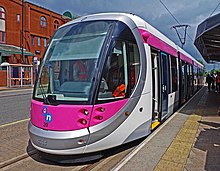Type a search term to find related articles by LIMS subject matter experts gathered from the most trusted and dynamic collaboration tools in the laboratory informatics industry.
 | |
 Location of the West Midlands within the United Kingdom | |
| Abbreviation | TfWM |
|---|---|
| Predecessor | West Midlands Passenger Transport Executive West Midlands Integrated Transport Authority |
| Formation | 17 June 2016 |
| Type | Public body |
| Purpose | Transport authority |
| Headquarters | 16 Summer Lane Birmingham, England |
Region served | West Midlands (county) |
Managing Director | Laura Shoaf |
Parent organization | West Midlands Combined Authority |
| Website | www.tfwm.org.uk |
Transport for West Midlands (TfWM) is the public body responsible for co-ordinating transport services in the West Midlands metropolitan county in England.[1] It is an executive body of the West Midlands Combined Authority (WMCA), with bus franchising and highway management powers similar to Transport for London.[2][3][4] TfWM's policies and strategy are set by the Transport Delivery Committee of the WMCA.
TfWM's initial priorities upon its establishment in 2016 were the expansion of the West Midlands Metro through East Birmingham, Brierley Hill and Birmingham Airport, improvements to the M5 and M6 motorways, and new cycle routes as part of a metropolitan cycle network. There are also plans to work with central government over the future of the underused M6 Toll.[5]
Before 2016, public transport services in the West Midlands were co-ordinated by the West Midlands Passenger Transport Executive, which adopted the brand Centro in 1990. Centro's policies were set by the West Midlands Integrated Transport Authority (WMITA). TfWM absorbed the functions, responsibilities, assets and staff of both of these organisations in June 2016, and the predecessor organisations were dissolved.
The WMCA's Transport Delivery Committee is a 19-member sub-committee of the Combined Authority Board. It forms part of TfWM's activities, and provides oversight of the operational delivery of transport across the West Midlands and advises the Combined Authority Board, through the Transport Portfolio Holder, on transport policy matters. The members are nominated by their respective local authorities; Birmingham City Council nominating seven members, the six other Metropolitan Boroughs nominating two members each. Each member has a single vote. The Chair and Vice-Chair of the Transport Delivery Committee are appointed by the Combined Authority Board.[6]

The WMCA is the Local Transport Authority and has a statutory responsibility to implement policies and strategies that co-ordinate and promote the use of public transport in the West Midlands. The WMCA's transport responsibilities include:[6]
Network West Midlands was the brand used by TfWM when it assumed responsibility for public transport from Centro in 2016. In 2018, the system was rebranded as "West Midlands Network,"[7] with a diamond motif designed to emulate the success of the Transport for London roundel. The identity uses LL Circular by Lineto as the primary typeface, replacing the Network typeface that was previously used.[8] All public transport infrastructure will carry the identity, with signage and liveries being replaced on a rolling basis.[9]
In 2021, it was announced that the "West Midlands Network" moniker would be dropped, leaving "Transport for West Midlands" as the public-facing brand.[10]

A new tram system in Coventry, Coventry Very Light Rail, is planned to open by 2026, with a network of 4-6 lines open by 2040. The first vehicle left the assembly line in March 2021 and was taken on a showcase in the city before being taken to Dudley for testing.[citation needed]
In August 2009, TfWM's predecessor, Centro, backed construction of a new railway in the West Midlands region for use by High Speed 2 trains, which would allow existing lines to have "better and more frequent local services".[11]
Sprint is a bus rapid transit scheme under construction between Walsall, Birmingham and Solihull. Further routes are planned across the region.

On 19 August 2018 National Express West Midlands and Diamond launched a joint timetable on services 42 West Bromwich to Tipton/Dudley and 43 West Bromwich to Bilston and 31 Mossley to Walsall 32 Lower Farm to Walsall, with National Express and Diamond buses repainted in red liveries carrying West Midlands Bus route branding.
From 15 March 2020 National Express West Midlands and Diamond launched a joint timetable on services 40 West Bromwich to Wednesbury via Friar Park.
In August 2021, Diamond announced that they would cease running joint timetables on partnership services (withdrawing completely from service 32) and no longer serve Dudley on service 42, citing loss of revenue due to Covid-19 travel restrictions.
On 5 December 2021 the partnership was back on for services 31/32; 42/43 and 40.

As part of the "Starley Network" Scheme across the West Midlands, a new transport mode by Transport for West Midlands was unveiled: West Midlands Cycle Hire (also known informally as West Midlands Cycle). As part of this a "West Midlands Walking and Cycling Commissioner" was appointed, Adam Tranter, whose job is to encourage Cycling and Walking as not just an activity, but a mode of transport. Projects to help this include things such as Birmingham's planned 200 km Dutch Cycling Network, Coventry's Starley Network of multiple safe, dutch style cycleways, and a new Cycle Hire Scheme.
In March 2021, Cycle Hire Docking Stations started to appear across the West Midlands, in Coventry, Birmingham, Dudley, Wolverhampton and Sutton Coldfield. Bikes can be hired for as long as you like and the cost of travel is often less than the equivalent bus journey. The scheme has been hugely successful,[according to whom?] and was expanded to areas such as Warwick University and Selly Oak.

TfWM's predecessor, Centro, was responsible for the reintroduction of tram services to the West Midlands, with the development of the Midland Metro, now known as West Midlands Metro. Plans for a multi-line light rail system for the West Midlands were first drawn up in the early 1980s. The first (and so far only) line of the Midland Metro was opened in May 1999 between Birmingham and Wolverhampton.[12] The line's first extension into the streets of Birmingham city centre, from its original terminus at Birmingham Snow Hill to Grand Central opened in May 2016.[13] 2 Lines are currently under construction in Dudley and Brierley Hill with 7 miles (11 km) of new track and work on another to serve Birmingham Curzon Street railway station (a High Speed 2 station), Digbeth has begun. Over £1bn of funding for a further 3 lines has been received to serve the areas of Walsall, Stourbridge & Halesowen.[14]
TFWM has been active in promoting the restoration of passenger services to both the Camp Hill Line and the Walsall to Wolverhampton Line, with five new stations opening or reopening, including Moseley Village, Kings Heath and Pineapple Road stations on the Camp Hill Line, and Darlaston James Bridge and Willenhall Bilston Street stations on the Walsall-Wolverhampton route. All were planned to be opened by the end of 2023.[15][16] However due to cost overruns as of November 2024 none of the planned new stations have opened.
TfWM is committed to the introduction of an integrated ticketing system. "n" branded tickets are valid across the entire network, on any operator within the TfWM area.
nBus tickets are valid on almost all operators' services in the West Midlands county. Tickets can be purchased for travel within various local travel areas or across the whole of the county, and are valid for periods ranging from one day to a year.[17] Metro travel may be added onto nBus passes.
nTrain passes are valid on all local train services within the Network West Midlands zonal rail map (including Hednesford), or to select out-of-county stations in the Birmingham travel-to-work metropolitan area.
Swift is the multi-modal, multi-operator smart travel card, similar to the Oyster card scheme in London. Rather than being a single card, it is a range of contactless passes and cards that share a common system and brand name. Centro began a phased rollout of the Swift card scheme in 2012, which was still ongoing in 2016 when responsibility for the scheme passed to TfWM. The system is expected to be extended across the local rail network as part of rail devolution in the West Midlands.[18]